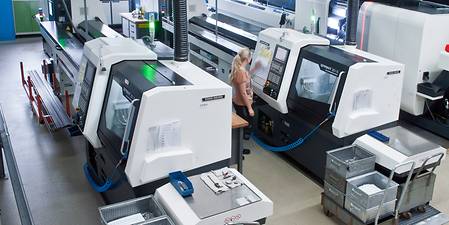4 to 5 completely equipped SPRINT 20|5 machines at the price of a multi-spindle machine
With its simple operation and high flexibility, at Sauter, single-spindle CNC automatic lathes from DMG MORI work as optimum additions to the conventional multi-spindle machines
Company Sauter Präzisionsdrehtechnik GmbH, established in 1942 with headquarters in Wehingen and another factory in Aldingen, both in Germany, employs around 300 staff, which produce more than 1.1 million high-precision turned parts every day for international customers. The mass of the parts as well as the high demand for quality and flexibility demonstrate that powerful, reliable single-spindle or multi-spindle standard automatic lathes are among the preferred means of production. Sauter has already been working amongst others with conventional and CNC-controlled multi-spindle automatic lathes as well as with single-spindle automatic lathes from DMG MORI since 1974. The increasing diversity of versions with reduced batch sizes, with at the same time increasing complexity of the components have now shifted the focus more towards single-spindle models in the recent past, as nine SPRINT 20|5 machines clearly demonstrate.
Sauter is not only a provider of high-quality turned parts for the automotive industry and other demanding industries. The company is also (and often especially) a competence partner of its customers, developing integrated processes. “As such we always focus on the needs of our customer,” say Hubert and Wolfgang Hafen, who together with their mother Lore Hafen lead the company in its third generation. Thanks to its process expertise the company can supply and produce ensured quality quickly and flexibly.
Sauter thus supports its customers throughout the course of an order, from the development phase to production and on to include questions of logistics. Their range of services includes both prototype and pilot series as well as small and large series up to mass production. It is the aim of Hubert and Wolfgang Hafen to ensure the best possible benefits for both their customers and their company: “On the one hand we want to offer our customers an optimum price/performance ratio while on the other hand we are faced with the challenge of operating efficiently and economically.” So Sauter, too, benefits from the development of sophisticated processes.
Sauter’s progressive philosophy can be seen particularly clearly in production, where processes are approached in a completely different way. “We don’t ask ourselves which existing technology we can use to produce a series, but what solely matters for us is what is the best production process for the particular task,” explains Jörg Fisahn, Production Manager at Sauter. This enables some completely new ways and precisely those perfect solutions, which characterize the company. But it also requires the machine park always being state-of-the-art.
“What is crucial for our success is to perfectly master all disciplines of the series-oriented high-tech turning in order to be able to always provide our customers with integrated as well as objective performance at the best possible conditions”, Wolfgang Hafen stresses, and gives the following example: “The increasing diversity of versions with resulting reduced batch sizes and at the same time ever more complex component geometries has for example led to single-spindle automatic lathes becoming a serious alternative more and more frequently.”
This change is further increased by material-related process specifications like dry machining or working with minimum lubrication. The constantly improving performance of the single-spindle machines available on the market is also contributing to the focus having noticeably shifted towards the automatic production lathes in the recent past. Naturally, cost and space requirements also play a role.
This statement can be impressively documented based on the example of the no less than nine DMG MORI single-spindle machines that have recently been installed. “We get at least four complete SPRINT 20|5 machines at the price of one multi-spindle machine”, says Wolfgang Hafen. And Jörg Fisahn adds: “The ratio of four single-spindle machines to one multi-spindle machine also applies to the space requirement, which is a clear advantage particularly in view of our limited production areas.”
In light of reduced batch sizes and increasing diversity of versions, the SPRINT 20|5 machines also impress with their flexibility. The standard versions of the machines are already fitted with four driven tool stations. A total of 23 tool pockets on two independent tool holders provide the required machining diversity in the process.
“Adding to this in particular is the powerful spindle for complex machining”, says Wolfgang Hafen. The SPRINT 20|5 can also be perfectly integrated into production with regard to quality: “The produced parts achieve a precision of an impressive 5 μm – this roughly corresponds to grinding quality.”
Further outstanding features according to Wolfgang Hafen are the simple programming, shorter setup times as well as straightforward operation. This way, untrained personnel can also be integrated into production comparatively quickly, while the multi-spindle machine remains the responsibility of more skilled employees.”
While Sauter is (still) focused on the automotive and commercial vehicle industry, new industries like medical technology have meanwhile been investigated, in order to position the company more distinctly and provide a broader basis for the future.




